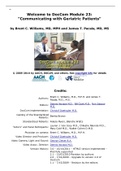""
Welcome to DocCom Module 23:
"Communicating with Geriatric Patients" by Brent C. Williams, MD, MPH and James T. Pacala, MD, MS
© 2005-2014 by AACH, DUCoM, and others. See copyright info for details Credits:
Authors:Brent C. Williams, M.D., M.P.H. and James T.
Pacala, M.D., M.S.
Editors:Dennis Novack M.D., Bill Clark M.D., Ron Saizow
M.D.
DocCom implementation:Christof Daetwyler M.D.
Casting of the Standardized
Patients:Benita Brown
Standardized Patients:Felecia Myers, Blanche Watts
"Actors" and Panel Participants:Lauren J. Van Scoy M.D., Chileshe Nkonde M.D.,
Mary Coté M.D., Walter Cohen D.M.D.
Physician on camera:Brent C. Williams, M.D., M.P.H.
Video Director and Producer:Christof Daetwyler M.D.
Video Camera, Light and Sound:George Zeiset B.A.
Video Assoc. Director:Dennis Novack M.D.
Version History:3.0 - 10/14/2011 - HTML5 version implemented -
iPod fully supported
2.1 - 12/01/2010 Revision by authors
2.0 - 7/16/2009 - Upgrade to version 4.0 of
DocCom
1.1 - 7/15/2009 - Revision by the editors 1.0 - 11/26/2008
Video is loading...
Video is loading...
Rationale
by Brent C. Williams, MD, MPH
The Patient's View
Video is loading...
The Doctor's View
Questions for Reflection: What do you fear most about your own aging?
In what ways do you care for older patients differently than younger patients with
similar conditions and life expectancy?
How do you feel when you are about to see a frail older patient who is medically
complex and functionally impaired?
Perhaps: Overwhelmed? Worried about your ability to assess and manage the
patient? Anxious about keeping on schedule?
When you discuss death and dying, do you fear your patients lose faith in you as a
doctor?
What are your feelings when you consider discussing complex decisions with
patients (such as the decision not to pursue diagnosis or treatment; decisions
about advance directives?)
Key Concepts: 1. Overcoming communication barriers such as sensory and cognitive impairments,
the presence of multiple illnesses, and vague or downplayed symptoms improves
care.
2. Addressing patients before caregivers, even if patients are cognitively impaired or
debilitated, and establishing their preferences about decision-making enhances
trust.
3. Asking patients directly about sensitive topics, such as end-of-life values,
suicidality, driving impairment and abuse and neglect improves assessment. 4. Even with cognitively impaired patients, encouraging a culture of open decision-
making that involves caregivers (with permission) facilitates adherence.
5. Assessing stress levels in caregivers and supporting them enhances care.
6. Welcoming and valuing collaboration and processing conflicts about it with other
health professionals increases efficiency, effectiveness and quality of medical care
Learning goals: At the conclusion of this module, you will be able to:
Overcome communication barriers such as sensory and cognitive impairments
and pursue vague or downplayed symptoms.
Even if patients are cognitively impaired or debilitated, address patients and
establish their preferences about decision-making, before addressing
caregivers.
Ask patients directly about sensitive topics, such as end-of-life values,
suicidality, abuse and neglect and driving impairment.
Even with cognitively impaired patients, encourage a culture of open decision-
making that involves caregivers (with permission).
Assess stress levels in caregivers and help them reduce caregiver burden.
Welcome and value collaboration, and process conflicts with other health
professionals when providing care to older patients.
INTRODUCTION Older patients are a large and growing portion of the practice of every physician
who cares for adults. Communicating with older patients, many of whom have
multiple complex, interacting problems can be daunting, especially when time is
limited.
In this module, we review techniques for communicating effectively with older
patients, especially those with sensory, cognitive, and functional impairments, and
for interacting with their caregivers. These skills and strategies assist physicians in
making more comprehensive diagnoses as well as effective and informed joint
decisions with patients and their caregivers during relatively brief encounters.
We also provide an opportunity for learners to examine their own assumptions,
values, and beliefs related to aging that may influence medical decision-making. We
show how ageism, comprised of negative attitudes about the elderly, can influence
care.
Ageism in Health Care Learners’ exposure to frail older adults who communicate poorly can result in
negative stereotyping; this is ageism. When ageism is unexamined, it impairs




